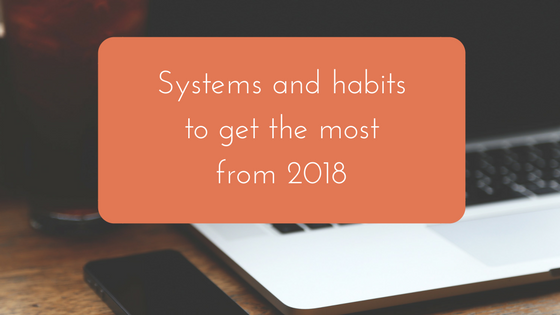Last week we looked at setting really clear goals (make sure you go back and do this if you haven’t done so already) to help us get the most from 2018.
Goals are all well and good, but all to often I’ve laid great goals, then not done the work towards them. And I know that I’m not alone in this.

Great systems and habits are the things that help you do the work, to reach your goal.
BUT (Yes, you know there is always a but!)
But, I find that a lot of people don’t really know what they are, or how to implement them in a way that helps them.
What is a habit?
noun
1.
an acquired behavior pattern regularly followed until it has become almost involuntary:
the habit of looking both ways before crossing the street.
Simply put, a habit is something that you do on a regular basis. Brushing your teeth is a habit.
You’ll find that aspects of your business have become a habit too, although some might be without you realising.
It might be a habit to spend an hour scrolling on Facebook, rather than posting in your group.
It might be a habit to check your emails first thing in the morning.
It might be a habit for you to respond to emails the moment they land in your inbox
It might be a habit for you to let all calls go to voicemail…
What are your business habits?
Take a moment over the next week to focus on the things you do out of habit.
Are these habits serving you, or are they working against you reaching your goal?
What is a system?
noun
1.
an assemblage or combination of things or parts forming a complex or unitary whole:
Or
Definition of business system: A methodical procedure or process that is used as a delivery mechanism for providing specific goods or services to customers.
Right… but what does that mean? In business terms, a system is a series of steps, or a process, which is always used to do a specific task.
For example, you might have a system for writing a new blog post. It gets drafted, it gets reviewed, your VA creates the social images for it, it gets scheduled, and all of the social media gets scheduled too.
Again, although you might not realise it, you probably have lots of systems in your business. Some you will have consciously created, others have just kinda happened.
You will have systems for how you handle a new customer, system for answering emails and systems for creating new content. They might not be documented processes (yet), but you’ll find you follow the same steps each time.
But are these systems really working for you?
If you find yourself meaning to write a blog, but never getting around to posting it, then maybe the system you are using isn’t working.
Think carefully about each step of the process that you go through.
What steps can you change?
Where can you delegate, or outsource?
Which steps can you delete or edit?
A system is a series of steps, but none of those steps are set in stone. You can change them to suit you, your time frames, your budget and your clients.
Getting your habits and systems right
Take some time this week to work out what your current habits and systems are… and what you would like them to be instead.
For example: I have a personal habit of taking my phone into the bedroom. It is the last thing I look at in the evening and the first thing I look at in the morning.
Instead, I would like it to charge in the study, and to go and get it in the morning when I am ready for it.
What about you?
What are your current systems and habits?
Think about some of the following points:
– How and when do you check emails?
– What do you do with tasks that need to be done, but aren’t going to be done right now (eg to do list)?
– How do you handle new ideas?
– What is your process for writing a new blog post?
– Who, how, when and what do you post on social media?
– How do you spend your time first thing in the morning?
– What are the jobs you do first when you sit down at your desk?
While business habits and systems are important, your personal ones are just as vital in setting up a business that works for you. Start to think about what you eat, when you sleep, and how you spend your down time.
You can’t change everything at once, you’ll just get overwhelmed.
But once you’ve seen how your systems and habits are impacting your work time, you can start making little changes to make the most of your time.
